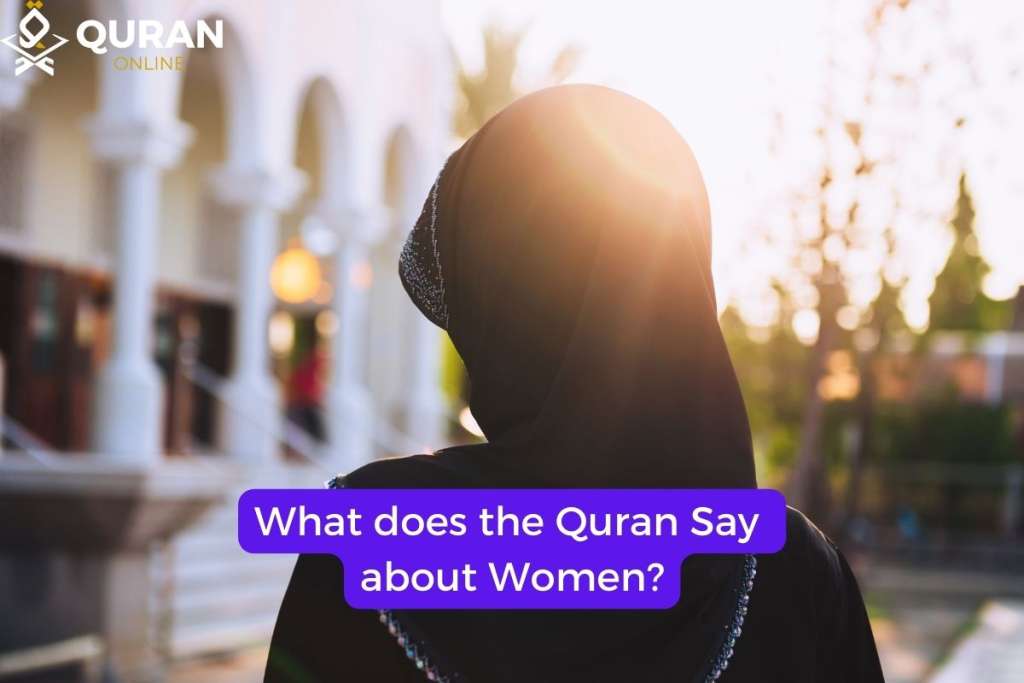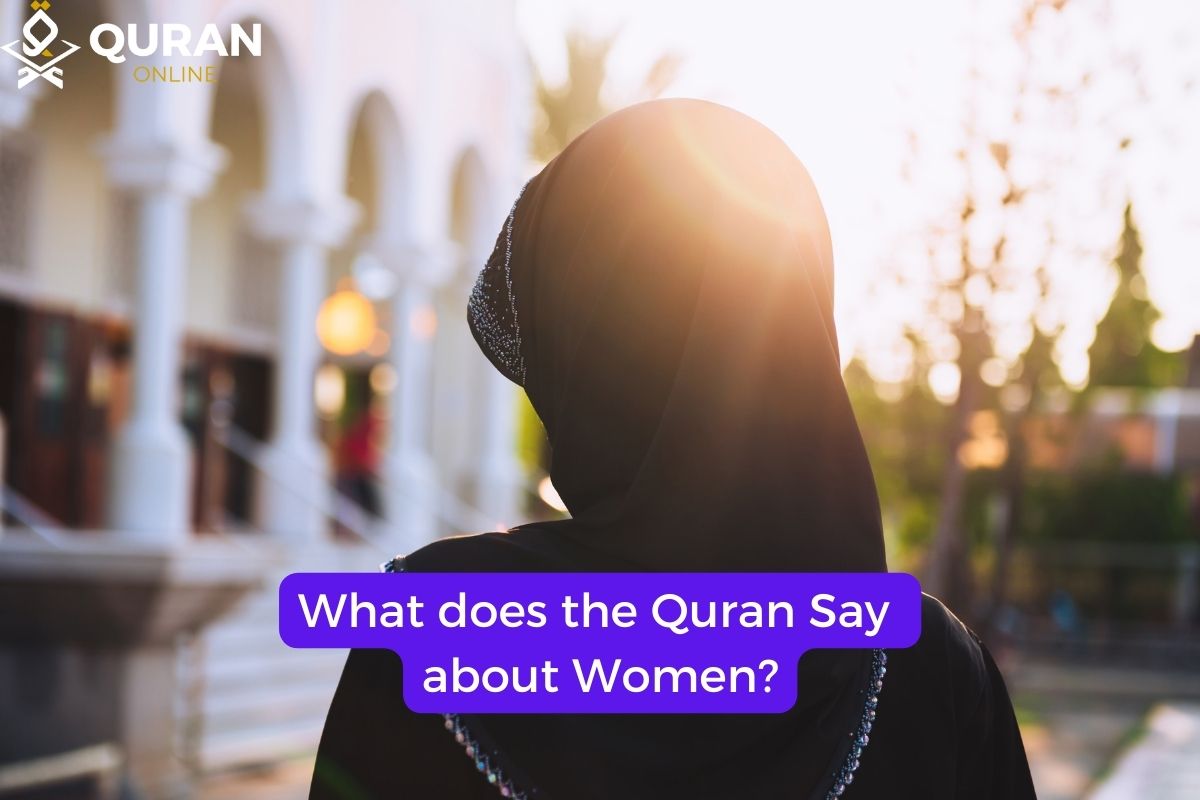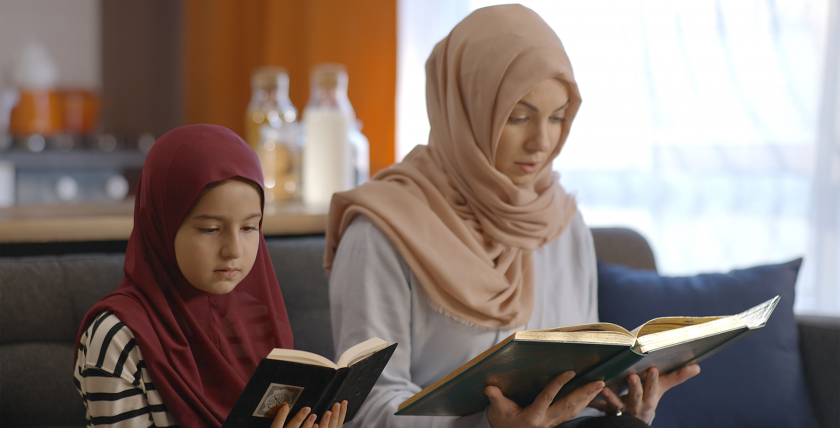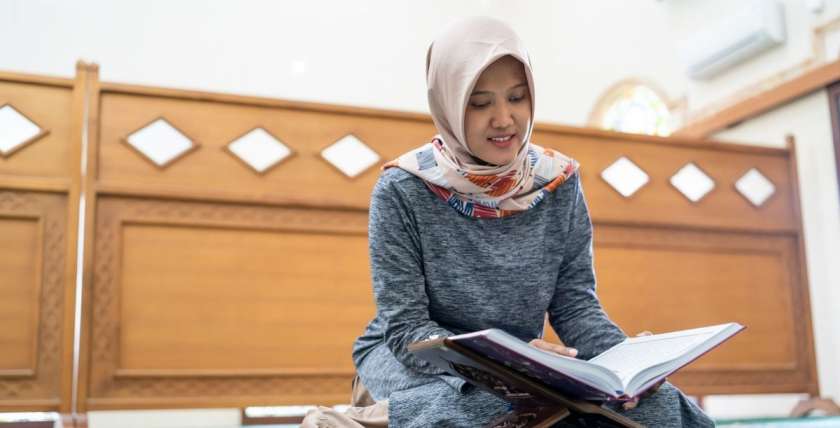One of the major criticisms of Islam is its alleged mistreatment of women, but have you actually researched what does the Quran say about women?
Those who buy into Islamophobic propaganda are quick to point to the religion’s rules on modesty, children, and marriage as proof of its disdain for females. In reality, however, these “rules” are rarely dictated by Islam itself. They are, instead, the work of national culture and tradition.
Take, for example, the wearing of the burqa.
Most contemporary Islamic scholars agree that there is nothing in the Quran or the Hadith to suggest a woman must cover all of her body.
Modesty laws outlined by Allah and Muhammad require a woman only to cover her hair and neck, which can be done using a simple hijab.
This clarifies one of many numerous misconceptions non-Muslims – and even some Muslims – hold about Islam’s opinion of females.
We’ll be tackling several other misconceptions throughout this article, drawing on both the Quran and the Hadith for guidance. Read on to find out what Islam really says about women.
What Does The Quran Say About Women?

Islam preaches a message of strict monotheism. It tells us that there is no god but Allah and, as such, nothing on this earth could exist save for the blessing and work of Allah.
However, it seems many men within the religion are quick to forget this fact when it comes to their treatment of women.
They support their mistreatment of their female counterparts by turning to the story of Adam, who was not only the first man created by Allah, but the very first human being to have existed.
The fact that Allah chose a male as the very first human being, they claim, is evidence enough for his favoritism towards men.
A Flawed Argument
However, it doesn’t take much thinking for us to figure out that this argument is immensely flawed. After all, the Prophet Muhammad taught that Allah created the animals before He set about creating Adam.
If we were to apply the logic of those who believe that the man is superior to the woman simply because the man was created first, then we would have to accept that Allah prefers animals to man.
Furthermore, He must prefer the trees to the animals because He created them first.
Following this trail, we’d end up at the conclusion that Allah must prefer nothingness to the universe because nothingness existed first. See how quickly that argument falls apart?
While Allah created the first man before He created the first woman, men and women are equal in His eyes. We learn this from multiple Quranic passages, including the following:
“O mankind! Be dutiful to your Lord, Who created you from a single person (Adam), and from him (Adam) He created his wife (Haawa), and from them both He created many men and women and fear Allah through Whom you demand your mutual (rights), and (do not cut the relations of) the wombs (kinship). Surely, Allah is Ever an All-Watcher over you.
Quran, 4:1
The Same Rules, Same Rewards and Punishment
It is also worth noting that the Quran teaches women will meet the same end as men, just as they met the same beginning.
This means every woman will have to stand before Allah on the Day of Judgment and be held accountable for their actions.
Those who lived a just life and embraced the monotheistic beliefs of Islam will be permitted into Paradise, where they will be free to enjoy all of its delights with none of the limitations and prejudices they may have faced on Earth.
We learn this from a number of Quranic passages, such as those outlined below:
“And whoever does righteous deeds, whether male or female, while being a believer – those will enter Paradise and will not be wronged, [even as much as] the speck on a date seed.”
Quran, 4:124
Other Passages to explain further:
“Whoever does righteousness, whether male or female, while he is a believer – We will surely cause him to live a good life, and We will surely give them their reward [in the Hereafter] according to the best of what they used to do.”
Quran, 16:97
“Indeed, the Muslim men and Muslim women, the believing men and believing women, the obedient men and obedient women, the truthful men and truthful women, the patient men and patient women, the humble men and humble women, the charitable men and charitable women, the fasting men and fasting women, the men who guard their private parts and the women who do so, and the men who remember Allah often and the women who do so – for them Allah has prepared forgiveness and a great reward.”
Quran, 33:35
From these passages and others like them, we can come to the conclusion that Allah does not give any thought to a person’s gender when deciding if they are worthy of Paradise or not.
Instead, He considers only their deeds and their faith. In the eyes of Allah, a sinning man is always inferior to a believing woman.
Eve Is Not Solely Responsible For The Fall Of Man
There are males within Islam who will attempt to justify their mistreatment of women by pointing to Eve’s eating of the apple in the Garden of Eden. This is the infamous act which caused the Fall of Man and resulted in Allah banishing mankind from His presence until the Day of Judgment. Or, at least, it is in Christianity.
A surprising number of Muslims fail to realize that Islam does not teach the same account of the Fall of Man that Christianity does.
In fact, the Fall of Man as a concept doesn’t exactly exist within the religion. Islam does acknowledge a story that is similar to the Bible’s Fall of Man – which includes many of the same characters and events – but it differs in many key areas.
Many of these differences relate to Eve, who known as “Haawa” in Islam.
In Christian tradition, Allah prohibited Adam and Eve from eating the fruit of the Tree of Knowledge, however, In Islamic tradition, however, prohibited Adam and Haawa from venturing anywhere near that tree.
In Christian tradition;
Eve is persuaded to taste of the fruit by a serpent. She eventually persuades Adam to join her, which ignites the fury of Allah, who then banishes them from the Garden of Eden. In the Quran, we are told the following:
“But Satan whispered to them to make apparent to them that which was concealed from them of their private parts. He said, “Your Lord did not forbid you this tree except that you become angels or become of the immortal.”
Quran, 7:20
“So he made them fall, through deception. And when they tasted of the tree, their private parts became apparent to them, and they began to fasten together over themselves from the leaves of Paradise. And their Lord called to them, “Did I not forbid you from that tree and tell you that Satan is to you a clear enemy?”
Quran, 7:22
From these passages, we learn that Adam and Haawa were both seduced by Satan and were persuaded to eat of the Tree of Knowledge together.
There is nothing in the Quran to suggest that Haawa was weaker than her husband or that she gave into temptation first and subsequently convinced him to act against his better judgment.
Men And Women Are Allies
Much like Christian societies, Islamic societies throughout history have misinterpreted their sacred texts. Sometimes this has been done through honest mistakes.
On other occasions, however, it seems as though it was done intentionally so as to rig society in favor of a select few.
A cynic may believe that the below verse from Surah At-Tawba has been willingly ignored by high-power males in order to justify their mistreatment of women.
As we shall see, it is certainly clear in its message, leaving little room for accidental misinterpretation. If a Muslim wishes to avoid living by its principals, they must willingly ignore it. It reads:
“The believing men and believing women are allies of one another. They enjoin what is right and forbid what is wrong and establish prayer and give zakah and obey Allah and His Messenger. Those – Allah will have mercy upon them. Indeed, Allah is Exalted in Might and Wise.”
-Quran, 9:71
Could this passage make it any clearer?
Men and women are allies and must work together to uphold the laws of Allah. This pretty much destroys the archaic school of taught which places women as second-class citizens below men.
Men Must Treat Their Wives Equally
A common cause for contention when it comes to Islam’s view on women is the Quran’s teaching that a man may take multiple wives. This law, critics say, is all the evidence one needs that Islam does not care about its female adherents. We cannot deny that Islam permits a man to take multiple wives. After all, the Quran itself declares a man may be married to up to four women at once, stating:
“And if you fear that you will not deal justly with the orphan girls, then marry those that please you of [other] women, two or three or four.”
- Quran, 4:3
It’s right there in writing, derailing the arguments of those well-meaning Muslims who attempt to defend their faith by simply denying such a ruling exists. In order to fully understand this law, however, it is important for us to understand the climate in which it was introduced.
While the Quran was being revealed to Muhammad, Arabia was very much still in its “pre-Islamic state”. Although Muhammad was building a significant number of followers, his message had not yet been accepted by most of Mecca, meaning the Meccan idol worshippers were still living by the laws of centuries prior.
These laws looked down upon women, in particular widows and female orphans. This posed a major social problem, as it was not uncommon for men at the time to die while protecting their territory in battle, meaning there were countless widows and female orphans left to fend for themselves in Mecca.
In order to remedy this, Allah permitted Muhammad’s followers to marry multiple women at a time, thereby giving widows a husband and orphans a father, allowing them to reclaim their rights in pre-Islamic Mecca.
However, this ruling was not introduced without a few conditions to protect the women and children. Quran, 4:3, the extracted included above, goes on to say:
“But if you fear that you will not be just, then [marry only] one or those your right hand possesses. That is more suitable that you may not incline [to injustice].
Quran 4:3
Although clocking in at a mere two sentences, this passage is one of the most important passages in all of the Quran. It reminds any male who may have become too excited at the prospect of taking multiple wives that they may only do so if they can treat all of them equally.
This means a man must be able to provide all of his wives with the same standard of living, showing no favoritism to one at the expense of the others.
Now, this does not mean a man may get away with taking multiple wives if he treats all of them poorly.
As the final sentence of the above extract points out, he must provide his wives with an acceptable living arrangement and may not “incline to injustice”.
Therefore, if a man is not able to treat multiple wives as equals to each other – and, indeed, equals to himself – he may only take a single wife (or as many wives as he is capable of supporting).
Women Resolving Legal Disputes
Another major criticism of Islam when it comes to its treatment of women is the Quran’s ruling on the involvement of women in the resolving of legal disputes. Famously – or, rather, infamously – the Quran states that the testimony of one man is equal to that of two women when it comes to trials and other legal matters. We will not dispute this. After all, the Quran plainly declares:
“O you who have believed, when you contract a debt for a specified term, write it down. And let a scribe write [it] between you in justice. Let no scribe refuse to write as Allah has taught him. So let him write and let the one who has the obligation dictate. And let him fear Allah, his Lord, and not leave anything out of it. But if the one who has the obligation is of limited understanding or weak or unable to dictate himself, then let his guardian dictate in justice. And bring to witness two witnesses from among your men. And if there are not two men [available], then a man and two women from those whom you accept as witnesses – so that if one of the women errs, then the other can remind her.”
- Quran, 2:282
On the surface, the above passage seems like a death blow to the argument of anybody attempting to defend Islam from allegations of sexism. Like so many of the Quran’s passages pertaining to social issues, however, it is important to remember the climate in which Quran, 2:282 was revealed. Prior to the coming forth of the Quran, women were forbidden from partaking in legal disputes altogether. Therefore, the ruling that two women may be permitted to submit a testimony in a trial was a major step forward without being so controversial as to ignite the rage of the idolaters and make the spread of Islam even more difficult than it already was. Of course, this ruling also served a practical purpose. At the time, the women of Mecca focused primarily on family matters. They raised children and ensured the upkeep of the household while their husbands traveled, often as caravan traders, or fought battles defending their territory. This meant any one woman called upon to testify in a legal dispute would be forced to abandon her maternal duties for the duration of proceedings. Her children would go hungry and her home would fall to pieces. The addition of a second woman allowed both females to share the burden of preparing a testimony, halving the time they must spend away from their families.
It is also worth noting that the Quran specifically assigns separate roles to both women involved in resolving a legal dispute. Let’s revisit the above passage and focus solely on the line pertaining to the testimonies of the women. It tells us:
“And if there are not two men [available], then a man and two women from those whom you accept as witnesses – so that if one of the women errs, then the other can remind her.”
- Quran, 2:282
Contemporary Islamic thought tells us that Allah’s intention is clearly for one of the two women to serve as a witness while the second works as just that; a second. They are to be the assistant of the woman entrusted with providing the primary testimony. If the lead female witness errs, the secondary female witness can “remind her”. Therefore, the primary female witness is just as important to the process of the primary male witness, she is merely provided further assistance owing to the many additional duties she is likely to be carrying out as a mother and wife.
Women Are Permitted To Pursue An Education
Many of our readers may remember the incident which brought Malala Yousafzai to prominence some years ago. On October 9th, 2012, the then-teenager was shot in the head in an attack orchestrated by the Taliban. Thankfully, Malala made a full recovery and is today one of the leading voices in Islamic-feminist thought. The motivation for the attempt on Malala’s life was traced back to her activism, which included encouraging young Muslim women to pursue an education, just as she was doing at the time. Female education beyond a certain age is in direct contradiction to the beliefs of many of the most conservative “Muslims”. You’ll notice we placed Muslims in inverted commas in the previous sentence. This is because no true Muslim could believe Islam forbids the further education of young women. In fact, the Prophet Muhammad himself delcared that it is the duty of all Muslims to pursue knowledge. Evidence of this can be found in the following Hadith:
“Anas ibn Malik reported: The Messenger of Allah, peace and blessings be upon him, said: Whoever goes out seeking knowledge is in the way of Allah until he returns.”
- Sunan al-Tirmidhī 2647
“Abu Darda reported: The Messenger of Allah, peace and blessings be upon him, said: Verily, the angels lower their wings for the seeker of knowledge. The inhabitants of the heavens and earth, even the fish in the depths of the water, seek forgiveness for the scholar. The virtue of the scholar over the worshiper is like the superiority of the moon over the stars. The scholars are the inheritors of the Prophets. They do not leave behind gold or silver coins, but rather they leave behind knowledge. Whoever has taken hold of it has been given an abundant share.”
– Sunan Abī Dāwūd 3641
“Anas ibn Malik reported: The Messenger of Allah, peace and blessings be upon him, said: Seeking knowledge is an obligation upon every Muslim.”
- Sunan Ibn Mājah 22
The last of the above three Hadith is particularly noteworthy as Muhammad specifically declares the pursuit of knowledge to be “an obligation upon every Muslim”. He does not assign it as a duty exclusively to males, which we should be thankful for, as countless women – including Malala herself – have made mammoth contributions to our society through their diligent study and pioneering work.
Conclusion
If you wanted to, you could certainly make the argument that the Quran – and Islam as a whole – presents women as second-class citizens. However, doing so would involve willingly ignoring, and in some cases even maligning, portions of the Quran and Hadith. This is the very tactic many critics of Islam use when attempting to paint the religion as one of sexism and misogyny. It is also the tactic used by the Islamic fundamentalists and extremists to justify their mistreatment of women. Upon even the slightest degree of inspection, however, this tactic and the argument it is intended to support fall to pieces. It is impossible for one to study the Quranic verses and Hadith outlined above and still come to the conclusion that Islam is somehow anti-women. Muhammad was a pioneer of women’s rights at a time when women were generally not permitted to work, head households, or provide testimony in legal disputes. In pre-Islamic Mecca, some parents even took to burying female newborns alive in order to be rid of them. The Quran changed all of this and laid a firm foundation upon which a society of equals could be built. While it cannot necessarily be said of all Muslims, Islam itself has always been a friend to women and will continue to be so as we march further into the 21st century.






